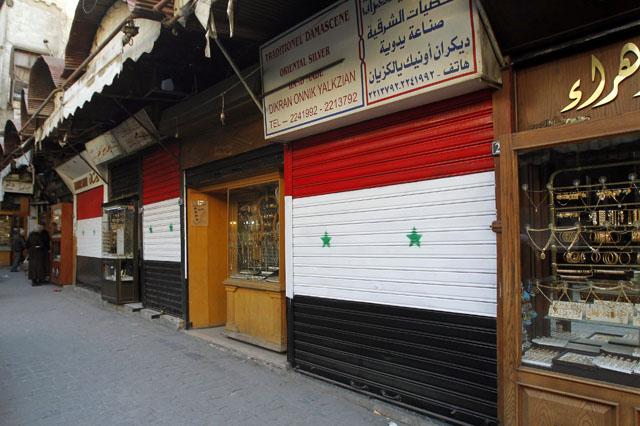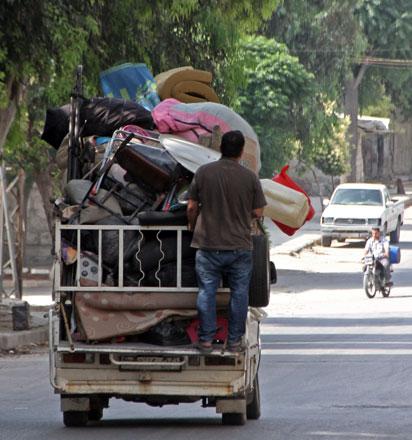You are here
Syria suffers $31b in war ‘damage’ — PM
By Agencies - Mar 18,2014 - Last updated at Mar 18,2014

DAMASCUS — Syria has suffered damage estimated at $31 billion as a result of its three-year civil war, Prime Minister Wael Al Halqi has said, a figure nearly equivalent to its gross domestic product (GDP).
“The damage caused by the war in Syria stands at 4.7 trillion Syrian pounds,” or $31.3 billion (22.5 billion euros), Halqi told the ruling party’s Al Baath newspaper.
He did not say whether he was referring exclusively to property damage or to some broader measurement.
The Economist Intelligence Unit has forecast that GDP will reach $34 billion this year.
In January, Local Administration Minister Omar Ghalawanji valued the losses at $21.6 billion.
Meanwhile, Halqi said the budget allocated for reconstruction this year stands at 50 billion pounds, up from 30 billion pounds last year.
“The current priority for the government is to return security and stability by giving our armed forces the means to fight terrorism,” said Halqi, referring to rebels seeking to topple President Bashar Assad.
“There is also a need to give people the basic commodities they need to meet their needs,” Halqi added, noting that Syria has enough wheat in store to feed the population for a year.
The prime minister also said the state pays £609 billion a year in salaries to civil servants, and that it spends $300 million a month on refined petroleum products.
A Syrian NGO says at least 146,000 people have been killed in the country’s war and that nearly half the population has been displaced.
Separately, a sizable but silent portion of those who live in Damascus and oppose the government say their constant fear of the police state is a flashback to some of the worst years Syrians endured before the war.
People continue to disappear into state detention centres. If they are released, they speak of torture and humiliation, sending ripples of fear through their community.
Among the merchants, almost everyone believes openly opposing the government carries great risks, including torture, death, or “inviting attention to the business”.
During a recent meeting of Damascene merchants, talk turned to the case of a colleague detained by Syria’s powerful and dreaded state security apparatus.
The man in question, it seemed, had overheard someone cursing President Bashar Assad, but failed to turn them in.
“Imagine that! They took him and beat him to a pulp and called him a mute devil for not reporting his colleague,” one merchant said. “Imagine the life we’re living now!”
While it is hard to verify the specific case, the discussion demonstrates the climate of fear and intimidation prevalent in the capital three years after the revolt against four decades of Assad family rule broke out.
For some time after the uprising erupted in the southern city of Deraa on March 18, 2011, it looked like the revolt would shatter the barriers of fear that long defined the relationship between Syria’s police state and its citizens.
Nowadays in government-controlled areas of Damascus that is far from the case. Armed men outnumber civilians on some corners, barricades prevent people from entering some streets and military hardware sits conspicuously between trees.
One affluent merchant said he held out as long as he could against painting the shutters of his shop the colours of the Syrian flag — a show of support for the government increasingly common in recent months — but he eventually had to give in.
“Was I going to be the odd one out? They [state security] probably would have ignored me, but they would have sent the tax department or some other authority to find some violation to shut me down. No thanks,” he said.
‘Assad is staying’
Violent crime in the capital is rare, but the city teems with armed men both in and out of uniform who often work long shifts for low pay.
With few provisions from the government, the men instead supply themselves from nearby grocers who would not dare demand full payment. The men stop taxis and name their own prices; the drivers do not protest.
In some cases, gunmen have posed as state security agents, demanded entry into private homes and burgled them. Police are too afraid to pry into a crime that might involve the intelligence apparatus, and the incidents go uninvestigated.
At petrol stations, a “security ID” issued for military, state security or other official business will get you to the front of the line, as well as into a specially reserved “military lane” at the checkpoints that have proliferated throughout the city.
The IDs — and their counterfeits — have become so popular that the cars in the military lanes now sometimes outnumber those in the regular queue. “Everyone in this country is somebody,” one driver remarked.
But for many Damascenes the most difficult aspect is the sense that very little of this will change anytime soon. One middle-aged woman who supported the uprising echoed many when she voiced her resignation.
“Assad is staying and he’s stronger than us and there’s nothing we can do about it,” she said.
Related Articles
Syrian businessmen and trade officials say they are worried the economic lifeline provided by Iran is under strain from plunging oil prices, despite public messages of support from Syria's strongest regional ally.
BEIRUT — Government air strikes on a northwestern Syrian village Monday killed at least 49 people and left survivors screaming in anguish as
DAMASCUS — A powerful car bomb exploded near a hospital in the central Syrian city of Homs Saturday, killing 16 people and wounding dozens,

















